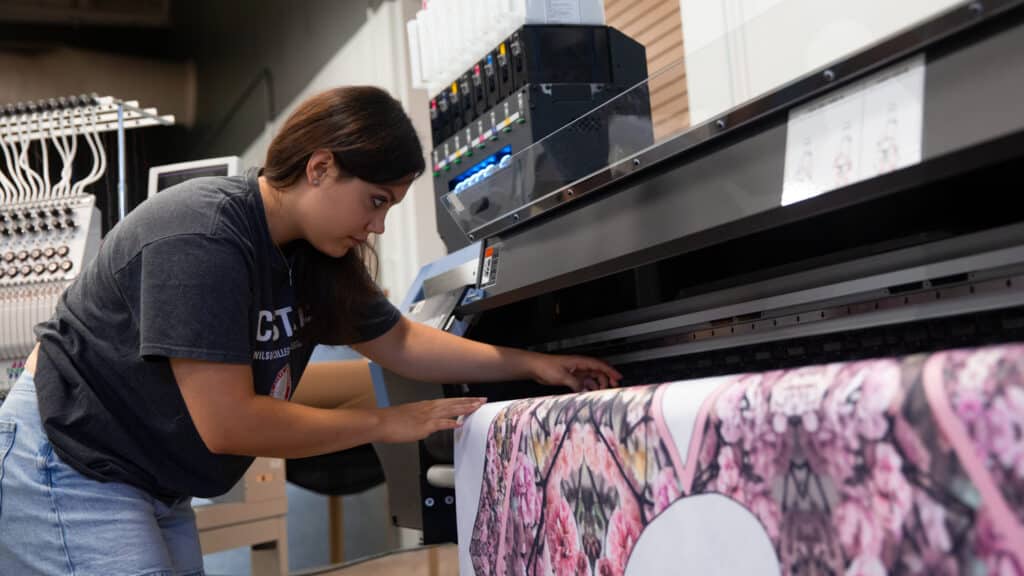Wilson College of Textiles Student Grows Her Apparel Business with Help From the Flex Factory

By Elyse Boldizar
Determining start-up costs, developing the product, marketing to potential customers — starting a small business comes with big challenges. But for Annie Hoyt, those challenges have always been worth it.
A junior studying fashion and textile management, Hoyt is the founder of Deni, an apparel business where she sells hand-crafted wrap skirts.
Embracing her entrepreneurial spirit
Hoyt started Deni during a gap year after graduating high school in 2020, but dreamed of starting her own business long before that.
“I started sewing when I was around five years old,” Hoyt says. “I later started my own company in high school where I sewed children’s dresses because they were smaller and production turnover was faster.
While her children’s clothing business fizzled out due to focusing on classes and other activities, Hoyt’s entrepreneurial spirit remains strong. Pursuing a concentration in fashion development and product management and a minor in business entrepreneurship, she says, has only strengthened her passion.
“I’ve always been a very motivated person, and I just really enjoy making things,” Hoyt says. “I’m also pretty stubborn, so the idea of being in charge of my own company is also a leading factor. I like to take control of my own life and try new things and always try to do the best that I can.”
Designing the Deni skirt
Hoyt named her company Deni after her great grandmother’s surname, who moved from Italy to the United States to start a family. The inspiration for Hoyt’s signature skirt comes from a skirt her mom wore often. She decided to elevate the skirt with the addition of pockets, a looser fit and an adjustable waist that makes the skirt one-size-fits-all.
“I love the aspect of adjustability in clothing and how your clothing can change with your body throughout the day,” Hoyt says. “Also, adding things like pockets to focus on comfortability as opposed to functionality in women’s clothing is something that I like to incorporate.”
Utilizing the Flex Factory
Throughout the manufacturing process, Hoyt has taken advantage of the Wilson College’s Flex Factory. Set to open fully in December of 2025, the Flex Factory is a research and development facility made to support business advancement and textile innovation by providing access to industry-level equipment.
Hoyt was introduced to the Flex Factory through her internship with the Zeis Textiles Extension (ZTE), an on-campus service for training, certification and access to prototyping equipment. She is one of the first students to utilize the Flex Factory’s printing and cutting machines.
“I’m using the facility to research how to best get from point A to point B,” Hoyt says. “from having the idea of a motif to putting it on a pattern and cutting the fabric using the Gerber cutter.”

Hoyt works under the guidance of Bailey Knight, a research technician who has been involved with transforming the Flex Factory’s prototype lab from a metal fabrication facility to a soft material lab.
“Annie has been helping ZTE beta-test a model for other entrepreneurial students interested in using the prototype lab’s equipment to follow,” Knight says. “I’ve been able to train her on equipment and she has been able to provide assistance in the lab.”
Hoyt credits the facility for giving her the tools to elevate her garments and advance her business, especially when it comes to pattern-making and simplifying production.
“I was not very good at making patterns in the past, but I’ve learned a bunch of new software programs,” Hoyt says. “The printer also helps with waste elimination and the cutter cuts down about three hours of time in the process. It’s changed the whole game.”
Well-equipped for the future
Hoyt is determined to expand her business while staying true to her passion for functional apparel and sustainability. The Wilson College, she says, has helped her see the complexity of entrepreneurship.
“Honestly, it’s been very eye-opening seeing how there are a lot of factors that I haven’t considered about production and about what consumers expect, especially with a rapidly changing set of expectations of how fast they want their clothing done, how they want it done,” Hoyt says. “Realizing what it takes to produce a garment financially and learning to manage my time has become the biggest thing. I’ve definitely had a slap in the face with the reality that running a business is not just designing, it’s a lot of other things.”
- Categories:


